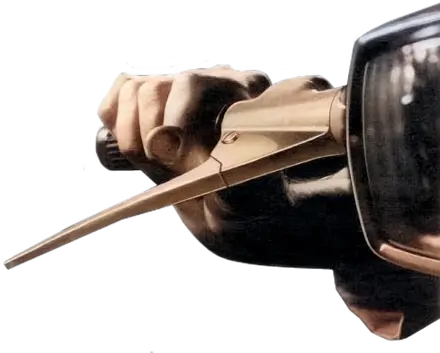How to charge a client
Drawn has a cute story about Picasso charging for his work. It helped me remember a story that an old photographer friend once told me.
A printing company calls in an engineer because their press is printing out of register. The engineer duly arrives, but instead of looking at the machinery, he looks at the print output.
Mmmmsays the engineer.I know just what’s wrong here.He rushes out to his van to fetch a hammer.Taking the hammer in one hand, the engineer strikes the press hard on the side, and the next piece of paper to emerge is perfect.
That’s greatsays the printer,How much do I owe you?
That will be £500replies the engineer.
What?asks the printer,You’ve only been here for five minutes!
Yes I knowsays the engineer.It’s £5 for the hire of the hammer…
… and £495 for knowing where to hit with it.
Replies
-
#1 On August 27, 2006 09:21 AM Dave said:
Hehe, reminds me of a certain multi-media group. I do believe one of them used to be listed on the brit pack section.
(Ed says: Amazing the different flavours these urban myths come in.)
-
#2 On August 27, 2006 10:04 AM Nick Roper said:
I guess we’re all guilty of the looking at the perceived cost of producing the result, rather than its value to us or the accumulated knowledge and experience that has gone into it. This can be particularly the case, as I’m sure everyone has found, with website development, where the end result is a nice, clean website that, apparently ’could have been done by the kid next door’
Unless the client is made aware of what differentiates your work from the kid next door, or the ’mate with a copy of Dreamweaver’ - or appreciates the added value that comes with it, then it’s sometimes hard going. We’ve tried various approaches, but it would be interesting to hear how others deal with the "that’s expensive" response to a quote. A sales consultant friend told me a good reply is "compared to what?"
-
#3 On August 27, 2006 05:33 PM Ryan Nichols said:
That’s exactly the case too! The citi bank logo was done in a few minutes in a client meeting. It’s the lifetime of knowledge and experience behind it that costs the money.
-
#4 On August 27, 2006 10:27 PM Raoul Pop said:
I completely agree. Web work has gotten so commoditized these days, that few clients understand the effort that goes on behind the scenes. Most people expect sites that cost under $100 or just a few hundreds, but want serious functionality. They compare custom web work with a templated site you can build for free on Google Pages, or on the .Mac service, when those things couldn’t be more different.
My approach with these sorts of "clients" (because you can’t really call them that) is to let them get burned with a free site where they can’t get the features and functionality they want, or some site designed by a newbie. Then they start to appreciate the value of a good product.
-
#5 On August 28, 2006 02:53 PM zanbowser said:
I’ll echo the usefulness of the response "compared to what": it’s saved several partners’ (a good way I’ve found of generating trust early in RFP) projects from my usual "storm off then demand more money when they come crying back" sort of storm off. When they have no logical comparison (usually I get the "mate with a copy of DW" argument), I explain what it is that I do with a quick wireframe on a laptop. Since I’ve almost always had some time to play with their corporate design assets, this garners an easy "wow" factor. The wireframe usually takes 30 minutes to an hour - as I explain what I’m doing while I’m doing it - with zero back-end functionality added. The end result is the partner’s understanding of the value in my hourly rate when the project goes out of scope. Also, it makes me look like some kind of wild-haired old wizard (only without the old or the wild hair).
The "Picasso" response truly defines our world as most of us have more than simple educational roots to our knowledge. We ARE what we do, most of us. I routinely get from partners the somewhat flippant reply of "oh, you stole that line from that commercial" when I tell them that "I live and breathe this stuff."
As stupid as it sounds; if you have problems selling your services to partners, go work in a car dealership for a few months. Find one with at least some preowned inventory that’s giving out the "free paid training" (preferably in a an affluent area), and you’ll sharpen those skills in no time (and likely make a small pile of cash). I know it helped me to sell the value of things instead of trying to sell the thing itself. Things are really hard to sell; however, in effectively selling the value of a thing, you won’t be able to keep that thing in stock.
-
#6 On August 28, 2006 02:59 PM Brian Woodlief said:
That story has been around in various forms for a long time. The first version I heard was the engineer being called in to fix a machine on the assembly line at Ford Motors back when Henry Ford first started the company. It may be an urban legend … Whether it is true or not at all, its still a fun read.
-
#7 On August 29, 2006 12:20 PM Matt @ Polon said:
In copywriting land we’ve been thinking a lot about how much our words are worth. Is there a case for being reassuringly expensive?
